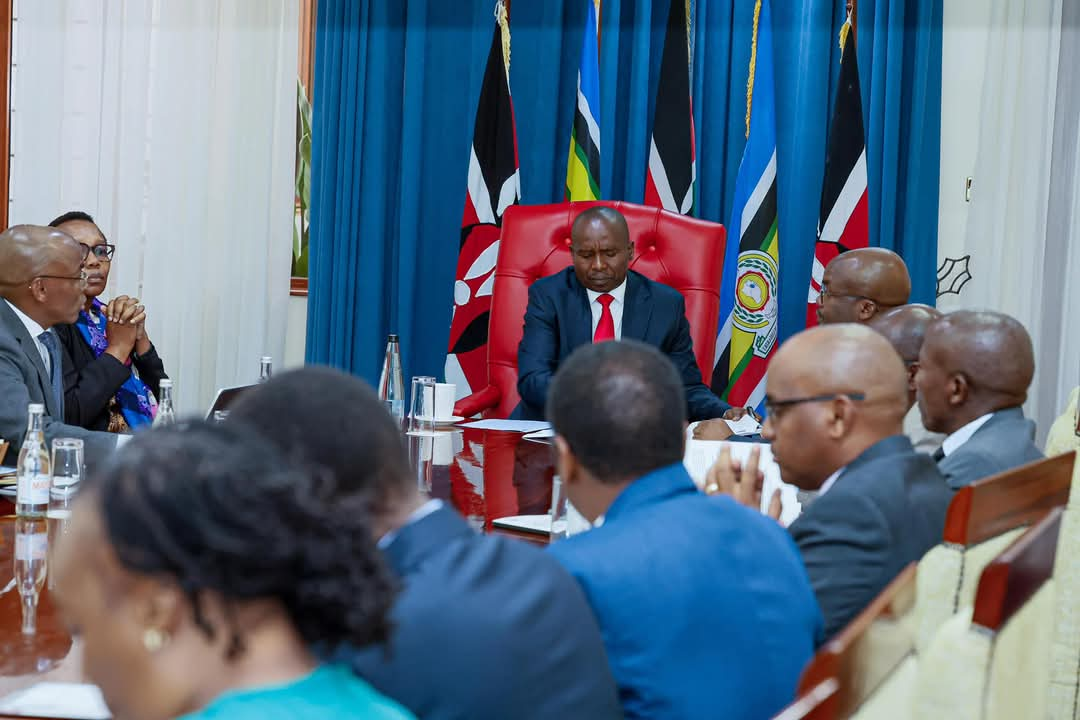
 Deputy President Kithure Kindiki
Deputy President Kithure KindikiDeputy President Kithure Kindiki had a relatively quiet
week, during which he represented President William Ruto in Kisumu at the Nyanza
Investment Conference and inspected development projects.
This followed a hectic previous week when he intensified meetings at his Karen residence, hosting delegations from various regions while indirectly challenging his predecessor, Rigathi Gachagua.
Kindiki later flew to Kisumu to represent Ruto at the Nyanza Investment
Conference, which brought together leaders from the four Luo Nyanza counties.
Speaking at the event last Saturday, Kindiki assured Luo Nyanza residents that the government was confident former Prime Minister Raila Odinga would win the African Union Commission (AUC) chairperson election.
The election, scheduled for Saturday in Addis Ababa, Ethiopia, will see African heads of state and government cast their votes.
Kindiki reiterated that President Ruto was Raila’s biggest campaigner ahead of
the highly anticipated contest.
“After the elections, Ruto and Raila agreed that Kenya should field a candidate for the AUC position. And because they have been friends for a long time—going back to Ruto’s days in ODM—they decided Kenya’s candidate should be Raila,” he said.
“The first person to vote for Raila will be William Ruto. His chief agent and mobilizer will also be William Ruto.”
On February 10, Kindiki held a consultative meeting with elected leaders, professionals, economic sector stakeholders, and grassroots leaders from Kiambu County.
He said the discussions focused on priority development projects and the implementation of national government programs.
The DP told the delegation that farmers in key agricultural sectors had earned higher incomes due to the government’s farmer-friendly interventions over the past two years.
“Better earnings have been recorded in most sectors, including coffee, tea, dairy, sugar, and maize, reflecting the success of Kenya Kwanza’s policies,” he said.
In the tea sector, total earnings were Sh161 billion in 2022, Sh81 billion in 2023, and Sh210 billion in 2024, according to the DP.
“We produced more tea last year than ever before. The numbers speak for themselves. It is not a miracle but the result of interventions aimed at boosting earnings—such as subsidized fertilizer, governance reforms, and tea legislation changes to eliminate cartels that exploit farmers,” Kindiki explained.
He also noted a significant increase in coffee earnings, attributing the improvement to a series of government-led interventions.
On February 11, Kindiki met with the National Steering Committee on Drought Response, which presented reports on the weather outlook for the March-May rainy season.
The committee briefed him on anticipated food security challenges and recommended intervention strategies for preparedness.
He assured that the government was taking all necessary measures to coordinate appropriate responses to the expected weather conditions in the coming season.
“The government will do whatever it takes to protect the country from potential disasters, including drought,” Kindiki said, emphasizing the importance of proactive measures.
He also acknowledged the critical role played by the committee in national disaster response efforts.
Additionally, the Deputy President was briefed by agencies such as the Kenya Meteorological Department, which forecasted above-normal temperatures in February and moderate to below-average rainfall in the first and second weeks of April.
The National Drought Management Authority reported that 1.8 million people across five counties are currently food insecure.

